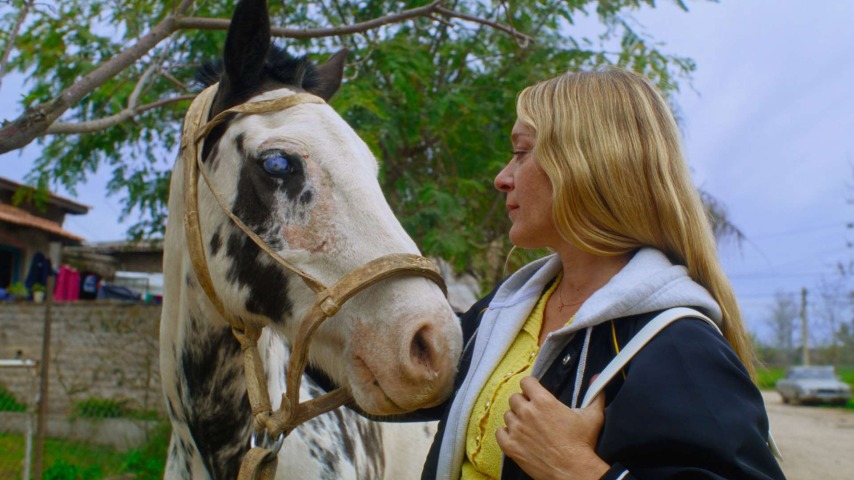Content creators, carcinogens, and conspiratorial shenanigans are all part and parcel of Magic Farm, an Argentina-set, would-be satire about the pathetic plight of a shortform documentary production team attempting to secure their next viral scoop. As with El Planeta, the 2021 debut feature from writer-director Amalia Ulman, Ulman’s Magic Farm injects biographical elements of her life into the story. But Magic Farm muddles the self-probing spirit of its predecessor, developing a reliance on cringe-inducing ketamine jokes and Brooklynite strawmen in lieu of engaging with the political misdeeds it casually refers to.
Based in New York City, Edna (Chloë Sevigny) is the chic face of a social media series that promises to platform “crazy subcultures around the world.” Elena (Ulman), Justin (Joe Apollonio), and Jeff (Alex Wolff) comprise her ragtag film crew, overseeing dinky camera rigs, audio setups, and travel logistics (all while on the receiving end of Edna’s acid tongue). After documenting the trend of “pointy boots” amidst young Mexican men, the team sets their sights on a musical craze in the city of San Cristóbal involving bunny ears. The only issue is that Jeff errantly pinpointed the rural Argentine town of San Cristóbal as the site of this odd showcase, unaware that it’s one of the most common names for locations in Latin America.
So begins a scheme to concoct their own story, collaborating with townspeople who are befuddled by their presence but eager to capitalize on a rare instance of American tourism. A SIM card proprietor grossly overcharges Justin for his product; a custom banner to promote an open casting call costs Jeff three times what it normally would. There are locals, though, who genuinely want to see the crew do well, likely due to Elena’s own Argentine roots. (Ulman herself was born in Buenos Aires, though she grew up in Spain, a distinction her character announces herself.) The hotel receptionist (Guillermo Jacubowicz) is somewhat bumbling, though endlessly accommodating (a trait that fans the flame of Justin’s affection), and a woman named Popa (Valeria Lois) lends her costume design expertise for the shoot.
But there’s a poisoned malaise that envelops San Cristóbal, one that has a glaringly obvious effect on the populace. Popa’s daughter, Manchi (Camila del Campo) has a smattering of large, purple birthmarks; her brother, Mateo (Mateo Vaquer Ruiz de los Llanos) has dwarfism; snippets of dialogue from other residents hint at an epidemic among young people involving cancer, migraines, and birth defects, all known to be a product of harmful glyphosates used for commercial farming. This coincides with a personal dilemma Elena grapples with outside of her professional duties, though the obvious danger of the crew needlessly exposing themselves to this widespread toxicity is never addressed, an odd narrative choice for characters that otherwise constantly gripe about every minor inconvenience.
Yet they are also keenly aware that the visible deformities among San Cristóbalins are an inherent boon to their project. “I don’t want to exploit some person because they’re weird,” Elena says when the idea of fabricating a story is first floated by Jeff. “Well, you picked the wrong job,” he scoffs. Their selfishness dovetails with self-awareness, which is why it’s disappointing that none of the interpersonal conflicts between them—or the San Cristóbal citizens they connect with—are ever truly articulated. There are teases of clandestine romances, juicy secrets, and simmering tensions, yet the focus of Magic Farm remains entirely surface-level, devolving into an underwhelming glance into the frankly boring process of “content creation.” Even the looming sexual assault allegations surrounding Edna’s husband Dave (an underutilized Simon Rex) are virtually inconsequential. What exactly is the purpose of spending time with these characters?
While Ulman is capable of melding the intimate details of her lived experience within a broader cultural commentary (the semi-autobiographical El Planeta stars Ulman alongside her real-life mother as petty criminals amid Spain’s economic crisis), Magic Farm is void of this sensibility. A palpable nihilism runs through the film, evinced by the stench of Dimes Square scenester-ism that infects these American visitors. Carlos Rigo Belliver’s cinematography relies on gimmicky fisheye lenses, GoPro POVs, and ultra-flashy transitions, yet this stylish vision is an aesthetic without aim.
Concocting caricatures of vain, ketamine-abusing Bushwick cool kids is not only laughably niche but totally ill-employed in Magic Farm. Ulman attempts to reference real injustices—sexual assault, literal corporate cancers, environmental ruin—with a nonchalance that is, ostensibly, supposed to reflect our collective desensitization to tragedy after tragedy, particularly among those who already cater to their every hedonistic whim. But the film simply feels steeped in half-baked observations mined from the NYC creative scene, rather than the sardonic wit necessary to lampoon it.
Director: Amalia Ulman
Writer: Amalia Ulman
Starring: Chloë Sevigny, Alex Wolff, Guillermo Jacubowicz, Joe Apollonio, Valeria Lois, Camila del Campo, Simon Rex
Release Date: April 25, 2025









































